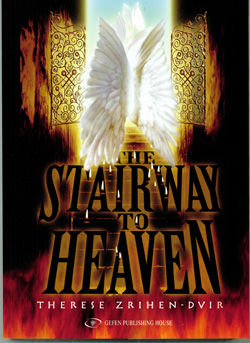The Stairway to Heaven by Therese Zrihen-Dvir, Geffen Publishing House, 2010, ISBN 978-965-229-474-6, 139 pages including afterword.
By Donald H. Harrison

SAN DIEGO – This historical work of fiction is a story of hope. Notwithstanding the book’s title, it is not about the celestial kind of hope; it is about human kind’s ability to pick itself up, even from the worst tragedies, and to go on living, perhaps to flourish.
We meet Naomi, a woman of her mid 50s, when she rushes to the hospital a young Russian immigrant Israeli soldier who had been wounded in a Palestinian’s suicide bombing of a commuter bus. The boy had traveled to Eretz Israel alone, and had no one to look after him during his recuperation. Naomi took on the responsibility, making “Eddie” part of her household.
 We learn that this act of kindness was in character for Naomi, whose life—and that of her adult daughter Nicole—had been earlier transformed when they witnessed the double suicide bombing on Jan. 22, 1995 of the Beit Lid bus station—an act which took the lives of 22 Israelis and wounded hundreds of others.
We learn that this act of kindness was in character for Naomi, whose life—and that of her adult daughter Nicole—had been earlier transformed when they witnessed the double suicide bombing on Jan. 22, 1995 of the Beit Lid bus station—an act which took the lives of 22 Israelis and wounded hundreds of others.
Shell-shocked, Naomi and Nicole attended the funerals and paid condolence calls to the families of as many of the victims as they could. Yet even amid all this death, their lives began to stir. In transporting a victim to the hospital, Nicole meets a young Israeli medical doctor and they become dedicated to each other. It takes Naomi much longer, but she meets a wealthy engineer with whom she might find a lasting relationship.
The book is far from Pollyannaish. Naomi, the protagonist, attempts to learn why Palestinians would choose death over coexistence with Israelis, why Palestinian mothers would raise their sons to become “martyrs,” or why Palestinian crowds would celebrate these “martyrs’” deaths with cheers and distribution of sweets. She arranges a meeting with a woman whose family member was a “shahid” or martyr, but neither the Palestinian nor the Israeli can make the other understand her point of view.
At another point, when Naomi expounds her viewpoints to Palestinian construction workers employed to build a house for Nicole, to them her dreams of peaceful relationships and humanitarian cooperation sound like so much ranting.
While offering us debate, this book does not provide answers inasmuch as the questions are unanswerable. It does, however, provide excellent insight into the Israeli psyche – and provides human dimension to the Arab-Israeli conflict.
*
Harrison is editor of San Diego Jewish World
Thank you so much dear Mr. Harrison.
Sincerely,
Therese